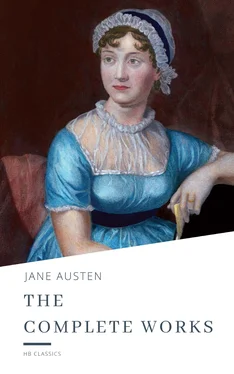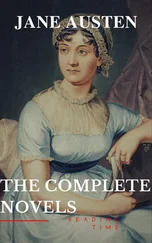"At any rate," said Elinor, wishing to prevent Mrs. Jennings from seeing her sister's thoughts as clearly as she did, "I dare say we shall have Sir John and Lady Middleton in town by the end of next week."
"Ay, my dear, I'll warrant you we do. Mary always has her own way."
"And now," silently conjectured Elinor, "she will write to Combe by this day's post."
But if she DID, the letter was written and sent away with a privacy which eluded all her watchfulness to ascertain the fact. Whatever the truth of it might be, and far as Elinor was from feeling thorough contentment about it, yet while she saw Marianne in spirits, she could not be very uncomfortable herself. And Marianne was in spirits; happy in the mildness of the weather, and still happier in her expectation of a frost.
The morning was chiefly spent in leaving cards at the houses of Mrs. Jennings's acquaintance to inform them of her being in town; and Marianne was all the time busy in observing the direction of the wind, watching the variations of the sky and imagining an alteration in the air.
"Don't you find it colder than it was in the morning, Elinor? There seems to me a very decided difference. I can hardly keep my hands warm even in my muff. It was not so yesterday, I think. The clouds seem parting too, the sun will be out in a moment, and we shall have a clear afternoon."
Elinor was alternately diverted and pained; but Marianne persevered, and saw every night in the brightness of the fire, and every morning in the appearance of the atmosphere, the certain symptoms of approaching frost.
The Miss Dashwoods had no greater reason to be dissatisfied with Mrs. Jennings's style of living, and set of acquaintance, than with her behaviour to themselves, which was invariably kind. Every thing in her household arrangements was conducted on the most liberal plan, and excepting a few old city friends, whom, to Lady Middleton's regret, she had never dropped, she visited no one to whom an introduction could at all discompose the feelings of her young companions. Pleased to find herself more comfortably situated in that particular than she had expected, Elinor was very willing to compound for the want of much real enjoyment from any of their evening parties, which, whether at home or abroad, formed only for cards, could have little to amuse her.
Colonel Brandon, who had a general invitation to the house, was with them almost every day; he came to look at Marianne and talk to Elinor, who often derived more satisfaction from conversing with him than from any other daily occurrence, but who saw at the same time with much concern his continued regard for her sister. She feared it was a strengthening regard. It grieved her to see the earnestness with which he often watched Marianne, and his spirits were certainly worse than when at Barton.
About a week after their arrival, it became certain that Willoughby was also arrived. His card was on the table when they came in from the morning's drive.
"Good God!" cried Marianne, "he has been here while we were out." Elinor, rejoiced to be assured of his being in London, now ventured to say, "Depend upon it, he will call again tomorrow." But Marianne seemed hardly to hear her, and on Mrs. Jenning's entrance, escaped with the precious card.
This event, while it raised the spirits of Elinor, restored to those of her sister all, and more than all, their former agitation. From this moment her mind was never quiet; the expectation of seeing him every hour of the day, made her unfit for any thing. She insisted on being left behind, the next morning, when the others went out.
Elinor's thoughts were full of what might be passing in Berkeley Street during their absence; but a moment's glance at her sister when they returned was enough to inform her, that Willoughby had paid no second visit there. A note was just then brought in, and laid on the table,
"For me!" cried Marianne, stepping hastily forward.
"No, ma'am, for my mistress."
But Marianne, not convinced, took it instantly up.
"It is indeed for Mrs. Jennings; how provoking!"
"You are expecting a letter, then?" said Elinor, unable to be longer silent.
"Yes, a little—not much."
After a short pause. "You have no confidence in me, Marianne."
"Nay, Elinor, this reproach from YOU—you who have confidence in no one!"
"Me!" returned Elinor in some confusion; "indeed, Marianne, I have nothing to tell."
"Nor I," answered Marianne with energy, "our situations then are alike. We have neither of us any thing to tell; you, because you do not communicate, and I, because I conceal nothing."
Elinor, distressed by this charge of reserve in herself, which she was not at liberty to do away, knew not how, under such circumstances, to press for greater openness in Marianne.
Mrs. Jennings soon appeared, and the note being given her, she read it aloud. It was from Lady Middleton, announcing their arrival in Conduit Street the night before, and requesting the company of her mother and cousins the following evening. Business on Sir John's part, and a violent cold on her own, prevented their calling in Berkeley Street. The invitation was accepted; but when the hour of appointment drew near, necessary as it was in common civility to Mrs. Jennings, that they should both attend her on such a visit, Elinor had some difficulty in persuading her sister to go, for still she had seen nothing of Willoughby; and therefore was not more indisposed for amusement abroad, than unwilling to run the risk of his calling again in her absence.
Elinor found, when the evening was over, that disposition is not materially altered by a change of abode, for although scarcely settled in town, Sir John had contrived to collect around him, nearly twenty young people, and to amuse them with a ball. This was an affair, however, of which Lady Middleton did not approve. In the country, an unpremeditated dance was very allowable; but in London, where the reputation of elegance was more important and less easily attained, it was risking too much for the gratification of a few girls, to have it known that Lady Middleton had given a small dance of eight or nine couple, with two violins, and a mere side-board collation.
Mr. and Mrs. Palmer were of the party; from the former, whom they had not seen before since their arrival in town, as he was careful to avoid the appearance of any attention to his mother-in-law, and therefore never came near her, they received no mark of recognition on their entrance. He looked at them slightly, without seeming to know who they were, and merely nodded to Mrs. Jennings from the other side of the room. Marianne gave one glance round the apartment as she entered: it was enough—HE was not there—and she sat down, equally ill-disposed to receive or communicate pleasure. After they had been assembled about an hour, Mr. Palmer sauntered towards the Miss Dashwoods to express his surprise on seeing them in town, though Colonel Brandon had been first informed of their arrival at his house, and he had himself said something very droll on hearing that they were to come.
"I thought you were both in Devonshire," said he.
"Did you?" replied Elinor.
"When do you go back again?"
"I do not know." And thus ended their discourse.
Never had Marianne been so unwilling to dance in her life, as she was that evening, and never so much fatigued by the exercise. She complained of it as they returned to Berkeley Street.
"Aye, aye," said Mrs. Jennings, "we know the reason of all that very well; if a certain person who shall be nameless, had been there, you would not have been a bit tired: and to say the truth it was not very pretty of him not to give you the meeting when he was invited."
"Invited!" cried Marianne.
"So my daughter Middleton told me, for it seems Sir John met him somewhere in the street this morning." Marianne said no more, but looked exceedingly hurt. Impatient in this situation to be doing something that might lead to her sister's relief, Elinor resolved to write the next morning to her mother, and hoped by awakening her fears for the health of Marianne, to procure those inquiries which had been so long delayed; and she was still more eagerly bent on this measure by perceiving after breakfast on the morrow, that Marianne was again writing to Willoughby, for she could not suppose it to be to any other person.
Читать дальше












